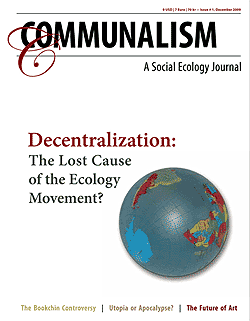Eirik is also author of The Anti-Jewish Riots in Oslo:
The Anti-Jewish Riots in Oslo
Communalism - A Social Ecology Journal

Current Issue
Building ecological cities
It will be impossible to mitigate climate change without transforming our cities, writes Jonathan Korsár . He advances a program for self-reliance, decentralization of energy, regionalization of the economy, new communications and direct democracy.
Decentralized energy
A decentralized energy system is effective and more sustainable, says David Morris of the Institute for Local Self Reliance.
9 arguments for democracy
To solve the climate crisis we need more democracy, not less, thinks Sveinung Legard.
Neighborhood politics
Matt Little discusses Milton Kotler's vision of neighborhood power in the 1960s.
Towards apocalypse or utopia?
Capitalism presents only false solutions to global warming, writes Brian Tokar, but what will be our response? He warns of the apocalyptic notions spreading in the ecology movement, and upholds the utopian dimension of social ecology.
Is art dead?
Adam Krause deconstructs the postmodernist/modernist dichotomy, and think that ecology explains art better.
Deep ecology and misanthropy
Bookchin was right in his critique of the misantrophy of deep ecology, writes Andy Price, and documents the inception of what he calls a “Bookchin caricature.”
Planting seeds
On Vashon Island in Washingtion, USA, a group of people have gathered to advance social ecology through art, community activism and land regeneration.
The current issue of Communalism also includes commentaries and book reviews.
|


